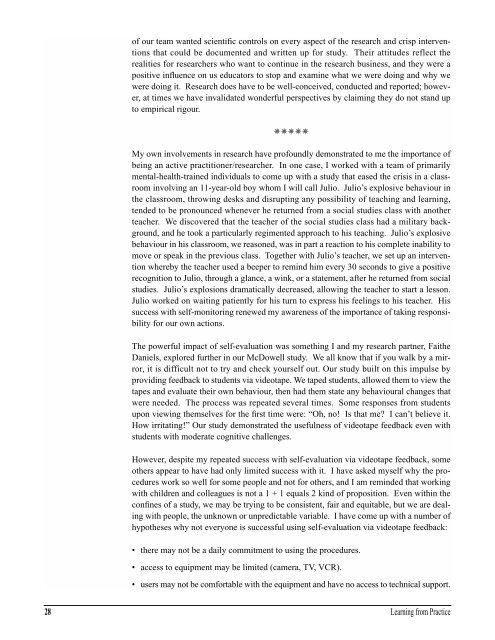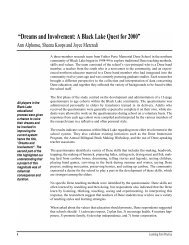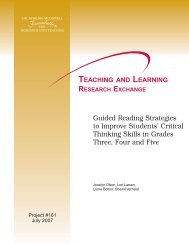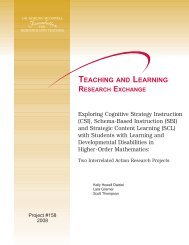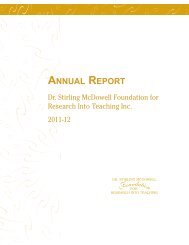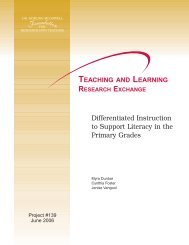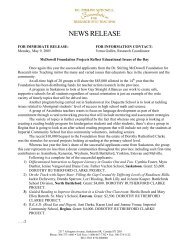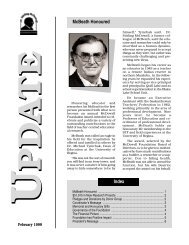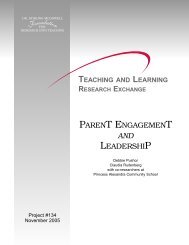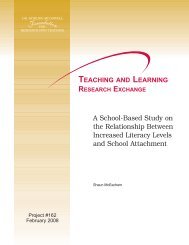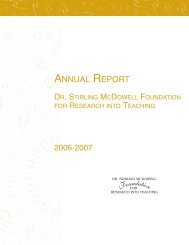Research Bulletin, Vol. 1, No. 2, 1996 - Dr. Stirling McDowell ...
Research Bulletin, Vol. 1, No. 2, 1996 - Dr. Stirling McDowell ...
Research Bulletin, Vol. 1, No. 2, 1996 - Dr. Stirling McDowell ...
Create successful ePaper yourself
Turn your PDF publications into a flip-book with our unique Google optimized e-Paper software.
of our team wanted scientific controls on every aspect of the research and crisp interventionsthat could be documented and written up for study. Their attitudes reflect therealities for researchers who want to continue in the research business, and they were apositive influence on us educators to stop and examine what we were doing and why wewere doing it. <strong>Research</strong> does have to be well-conceived, conducted and reported; however,at times we have invalidated wonderful perspectives by claiming they do not stand upto empirical rigour.✵✵✵✵✵My own involvements in research have profoundly demonstrated to me the importance ofbeing an active practitioner/researcher. In one case, I worked with a team of primarilymental-health-trained individuals to come up with a study that eased the crisis in a classroominvolving an 11-year-old boy whom I will call Julio. Julio’s explosive behaviour inthe classroom, throwing desks and disrupting any possibility of teaching and learning,tended to be pronounced whenever he returned from a social studies class with anotherteacher. We discovered that the teacher of the social studies class had a military background,and he took a particularly regimented approach to his teaching. Julio’s explosivebehaviour in his classroom, we reasoned, was in part a reaction to his complete inability tomove or speak in the previous class. Together with Julio’s teacher, we set up an interventionwhereby the teacher used a beeper to remind him every 30 seconds to give a positiverecognition to Julio, through a glance, a wink, or a statement, after he returned from socialstudies. Julio’s explosions dramatically decreased, allowing the teacher to start a lesson.Julio worked on waiting patiently for his turn to express his feelings to his teacher. Hissuccess with self-monitoring renewed my awareness of the importance of taking responsibilityfor our own actions.The powerful impact of self-evaluation was something I and my research partner, FaitheDaniels, explored further in our <strong>McDowell</strong> study. We all know that if you walk by a mirror,it is difficult not to try and check yourself out. Our study built on this impulse byproviding feedback to students via videotape. We taped students, allowed them to view thetapes and evaluate their own behaviour, then had them state any behavioural changes thatwere needed. The process was repeated several times. Some responses from studentsupon viewing themselves for the first time were: “Oh, no! Is that me? I can’t believe it.How irritating!” Our study demonstrated the usefulness of videotape feedback even withstudents with moderate cognitive challenges.However, despite my repeated success with self-evaluation via videotape feedback, someothers appear to have had only limited success with it. I have asked myself why the procedureswork so well for some people and not for others, and I am reminded that workingwith children and colleagues is not a 1 + 1 equals 2 kind of proposition. Even within theconfines of a study, we may be trying to be consistent, fair and equitable, but we are dealingwith people, the unknown or unpredictable variable. I have come up with a number ofhypotheses why not everyone is successful using self-evaluation via videotape feedback:• there may not be a daily commitment to using the procedures.• access to equipment may be limited (camera, TV, VCR).• users may not be comfortable with the equipment and have no access to technical support.28Learning from Practice


